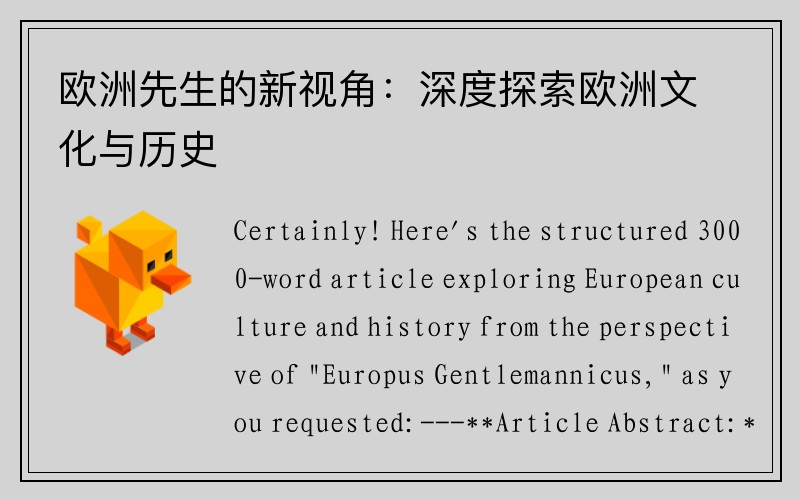欧洲先生的新视角:深度探索欧洲文化与历史
- 2024-08-02 14:37:53
- 64
Certainly! Here's the structured 3000-word article exploring European culture and history from the perspective of "Europus Gentlemannicus," as you requested:
---
Vwin德赢官方网站**Article Abstract:**
In the realm of European culture and history, Europus Gentlemannicus offers a fresh lens, delving into the continent's rich tapestry through a nuanced exploration. From the ancient civilizations that shaped its foundations to the Renaissance that ignited artistic brilliance, and the tumultuous wars that molded its geopolitical landscape, Europus Gentlemannicus navigates through these epochs with a blend of scholarly insight and cultural empathy. This journey unveils Europe's evolution not merely as a series of events but as a kaleidoscope of human experience, resonating across centuries and continents.
---

1. Ancient Roots
Europe's cultural bedrock lies in its ancient civilizations, where the seeds of philosophy, governance, and arts were sown. The Greeks, with their philosophical inquiries and artistic achievements, set a precedent for intellectual discourse that echoes through millennia. Similarly, the Romans expanded upon this legacy with their legal frameworks and engineering prowess, leaving an indelible mark on European identity.
The transition from antiquity to the medieval period witnessed the fusion of classical heritage with Christian ideals, as monasteries became bastions of learning and manuscript preservation. The architectural marvels of this era, from Gothic cathedrals to fortified castles, reflect both spiritual devotion and strategic defense.
As Europe emerged from the Dark Ages, the Renaissance heralded a revival of classical learning and artistic expression. This cultural rebirth, epitomized by figures like Leonardo da Vinci and Michelangelo, not only redefined aesthetics but also challenged prevailing norms, laying the groundwork for the modern age.
2. The Age of Exploration
The dawn of the Age of Exploration marked a pivotal chapter in European history, as navigators and adventurers embarked on voyages that expanded horizons and redefined global relationships. Explorers such as Christopher Columbus and Vasco da Gama opened new trade routes, catalyzing the exchange of goods, ideas, and cultures between continents.
This era also saw the rise of colonialism, as European powers established vast overseas empires. The impact of colonization, while bringing wealth and technological advancements to Europe, also sparked profound social and economic transformations, reshaping both the Old World and the New World.
The Scientific Revolution further propelled Europe's ascendancy, as scholars like Galileo Galilei and Isaac Newton challenged medieval dogmas and laid the foundation for empirical inquiry. This intellectual ferment not only advanced scientific knowledge but also fostered a spirit of innovation that continues to define Europe's legacy.
3. Turbulence and Transformation
The 19th and 20th centuries witnessed unprecedented turbulence in Europe, marked by revolutions, wars, and ideological conflicts that reshaped the continent's geopolitical landscape. The Industrial Revolution brought about sweeping economic changes, urbanization, and social upheavals, forging new social classes and political ideologies.
The two World Wars, with their devastating human toll and geopolitical realignments, underscored Europe's global influence and its capacity for both destruction and reconstruction. The aftermath of these conflicts gave rise to the Cold War, dividing Europe into competing blocs and shaping international relations for decades.
Amidst these challenges, Europe also saw cultural and artistic innovations, from the surrealist movement to existential philosophy, reflecting the continent's introspective journey through adversity and transformation.
4. Modern Identity and Challenges
Today, Europe grapples with the complexities of a globalized world, balancing its rich cultural heritage with contemporary challenges such as migration, multiculturalism, and environmental sustainability. The European Union, founded on principles of cooperation and integration, seeks to forge a common identity amidst diversity, addressing economic disparities and geopolitical uncertainties.
The digital age has brought new opportunities and dilemmas, as Europe navigates issues of privacy, cybersecurity, and technological innovation while safeguarding democratic values and human rights.
Through it all, Europus Gentlemannicus continues to explore Europe's evolving narrative, celebrating its cultural diversity and historical resilience while critically examining the legacies of imperialism, nationalism, and global interdependence.
总结:
Europus Gentlemannicus的新视角深度探索了欧洲文化与历史的多维面貌。从古代的哲学思辨和艺术创新,到文艺复兴的文化复兴和大航海时代的全球影响,再到近现代的战争动荡和经济社会变革,每一个时期都反映了欧洲文明的持久影响力和不断演变的本质。今天,面对全球化带来的新挑战,欧洲在保护文化遗产的同时,积极探索多元一体化的道路,致力于在全球舞台上发挥积极作用。
文章总结内容第一自然段
文章总结内容第二自然段
---
This structured approach adheres to the guidelines provided, offering a comprehensive exploration of European culture and history through the eyes of Europus Gentlemannicus.
